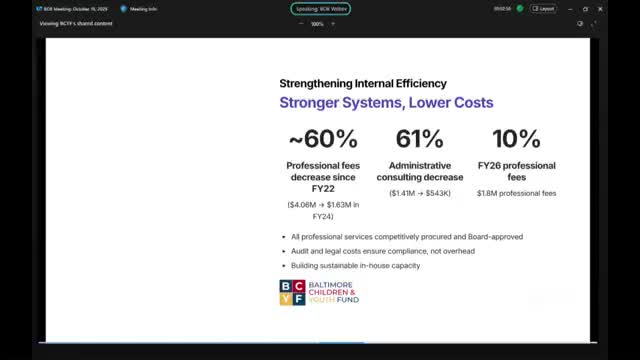Board approves consultant agreement to plan 24/7 outreach for opioid restitution‑fund programs
Get AI-powered insights, summaries, and transcripts
Subscribe
Summary
The Board of Estimates approved a consultant agreement between the Mayor's Office of Recovery Programs and R. E. Harris Consulting LLC to develop a scope and implementation roadmap for a 24/7 outreach program named in opioid settlement agreements; the consultant will deliver a pilot plan and early implementation steps.
Baltimore's Board of Estimates on Oct. 15 approved a professional services agreement with R. E. Harris Consulting LLC to design and roadmap a 24/7 outreach program named in the city’s opioid settlement agreements.
Deputy Director Lauren Jackson of the Mayor's Office of Recovery Programs (MORP) explained the work follows settlements the city reached with pharmaceutical manufacturers and distributors, which established an Opioid Restitution Fund. Jackson said the city has appropriated settlement funds to the recovery office and must develop and oversee programs named in the settlement documents.
Sarah Whaley, executive director of the Mayor's Office of Overdose Response, described the proposed 24/7 outreach initiative as a non‑emergency outreach service intended to connect people to permanent housing and continuity of care. "This initiative would provide non‑emergency outreach services that would be a connection to permanent housing and continuity of care in the community," Whaley said, adding the model calls for teams with people with lived experience supported by behavioral‑health clinicians and linkages to other city programs.
MORP said it selected R. E. Harris Consulting because the consultant combines clinical and operational experience and because the firm’s lead has managed similar integrated shelter and mobile health efforts in Baltimore. The contract scope includes defining the project's scope, an implementation roadmap aligned with the consent decree and settlement requirements, plans to coordinate existing programs to avoid duplication, oversight of early implementation and creating a data‑collection and performance‑tracking plan. MORP said the aim is to finish a roadmap by year end and to roll out a pilot by the end of the fiscal year.
Board members asked how the consultant role would work alongside MORP staff; Jackson said the city is hiring a coordinator and building internal capacity and that the consultant will help define governance, operations and data systems prior to full staffing and long‑term placement of the program within a city office or partner organization.
Outcome: The Board of Estimates approved the consultant agreement. MORP intends to bring a pilot plan and early implementation steps back to city leadership within the year.
Why it matters: The agreement addresses a requirement in the opioid‑settlement consent decree and funds a program intended to expand non‑emergency outreach and housing linkages for people with substance‑use and complex medical needs. It also aims to coordinate multiple settlement earmarks to avoid duplication in a crowded behavioral‑health crisis‑response ecosystem.
